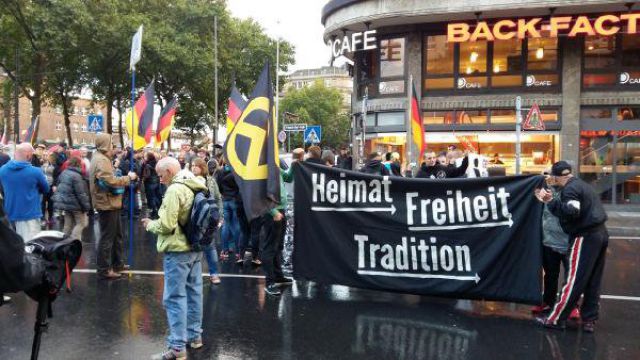While Germany is massively accepting refugees from the Middle East, and the politicians are still unsuccessfully seeking ways out of the current crisis, the dynamics of the growth of right-wing radical violence have reached alarming proportions. SPIEGEL and Süddeutsche Zeitung almost simultaneously reported, with reference to the secret analytical report of the Federal Criminal Police Office, that there were 505 attacks on refugee hostels for the first three quarters of 2015. For comparison, last year there were 177 such incidents, and only 18 in 2011. Most of the attacks on the shelters are noted in the federal state of North Rhine-Westphalia, which is understandable in terms of demographics: this region is the most populous in Germany and, consequently, the migrant admission quota is also the highest.
In most cases, the attacks were accompanied by property damage (147), propaganda (97), incitement of inter-ethnic strife (61), damage to human health (29) and arson (28). The report of the Criminal Police also expressed concern about the transition of violence to a "political" level: the politicians, who agitate for the reception of refugees, as well as social and economic actors contributing to the construction and operation of new shelters, may become the victims of attacks by the right-wing groups. The police mentioned as an alert the recent attack of the right-wing extremist Frank S. on a candidate to be mayor of Cologne, Henriette Reker, during her election campaign. Reker was stabbed in the throat, but the doctors saved her life. Just before the attack, the perpetrator shouted: "I'm doing it for your children." According to investigators, the motives of the crime have been associated with Recker's position on the issue of refugees. By the way, Henriette Reker has won the elections. She was told about it in the hospital.
According to the expert Michael Getsenberg, recently there has been close and intense interaction between various right-wing groups. But, according to Getsenberg, it would be wrong to talk about a coordinated right-wing terrorist network. The investigated attacks on hostels were usually spontaneous. They were committed by people who lived in the vicinity of refugee shelters, and their aggression was warmed by alcohol. However, the expert noted that the climate in society is becoming more aggressive, and this trend will continue. Propaganda and incitement to ethnic strife are intensified by the right-wing parties. "In such circumstances, the emergence of a terrorist network can occur at any time," Michael Getsenberg believes. Meanwhile, the President of the European Parliament, German socialist Martin Schulz, said that "the willingness of the German right-wing extremists to commit violence and cruelty" is significantly higher than in other European countries.

At the same time, there is a growing radicalization of the PEGIDA movement, which has appeared in Dresden and opposes the Islamization of Europe. Last week about 20 thousand supporters of the movement celebrated the anniversary of the movement on Theatre Square in Dresden. German Economy Minister Sigmar Gabriel draws attention to the fact that the rhetoric of the protesters during the rally in many respects is identical to the rhetoric of the national socialists in the Weimar Republic at the beginning of their rise to power. Thus, the protesters call the Parliament "a talking shop of traitors" (Quasselbude von Volksverrätern), the media "false press" ("Lügenpresse"), modern democracy - "democracy of old parties" ("Altparteien-Demokratie»).
There was a controversy at the rally, demonstrating that the spirit of National Socialism is still alive in Germany. So, one of the main speakers was a German Turk, the writer known for his extremist views, Akif Pirinçci. The fact that Pirinçci is a migrant himself, who moved with his parents from Istanbul to Germany when he was 10, did not prevent him from adhering to ultra-right views. He stated at a rally in Dresden: "It is clear that the authorities have absolutely no fear of or respect for their own people, so they, rather, will just offer to leave it their country if they (the people) don't ward it off. Of course, there could be other alternatives. But unfortunately, the concentration camps are no longer functioning." According to media reports, Pirinçci's speech was greeted with applause from the feverish crowd. It is noteworthy that after this Nazi statement he freely talked for another 25 minutes. After the hype in the media, the head of the movement Lutz Bachmann apologized for Pirinçci's words. The Prosecutor General's Office announced the start of checks in the writer's statement for the presence of grounds for a criminal case under the article on 'incitement of ethnic hatred'.

But one thing is clear: a year after the founding of the movement, the organizers of which, according to the Minister of Justice Heiko Maas, are "right-wing radicals", it did not become weaker. PEGIDA didn't not split - on the contrary, it become more structured after a year of work, and the current political background just serves to strengthen it further. If in the summer many politicians thought that the movement had sunk into oblivion, the public discourse on the issue of refugees breathed new life into it. Just as in the far-right party AfD (Alternative für Deutschland), which is openly sympathetic to PEGIDA. The results of recent opinion polls show that the AfD party is confidently overcoming the 5% barrier required for representation in the Bundestag.






